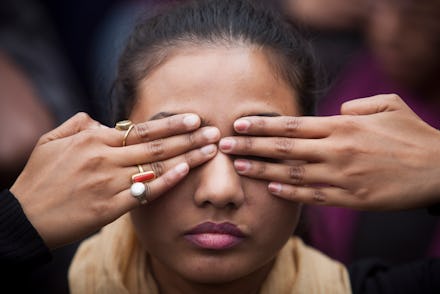India Banned a Rape Documentary from Airing on TV — Here's One Station's Brave Response

Viewers across India tuned to the NDTV news channel Sunday night, when the BBC rape documentary India's Daughter had been scheduled to air. The film, which features interviews with some of the men convicted of raping and beating a 23-year-old woman to death on a Delhi bus in 2012, was banned by the Indian government last week.
Instead of a movie, viewers got an hour of this:
According to the Guardian, NDTV, one of India's most prominent news networks, featured a completely silent screen from 9 p.m. to 10 p.m., accompanied by running text at the bottom with quotes from "well-known Indians" expressing their distress around the ban.
The only noise came from a quiet heartbeat whenever statistics about rape appeared in the text. "One rape every 20 minutes," it read, according to the Guardian.
This was the latest in a string of protests aimed at the Indian government's recent decision to ban the film — a decision that represents a disturbing global trend whereby rape gets treated like a taboo inconvenience rather than an epidemic that needs to be eradicated.
Controversy arose when preview clips from the film, helmed by British director Leslee Udwin, were broadcast online last week. Mukesh Singh, the driver of the bus, had some especially chilling words for the camera.
"A girl is far more responsible for rape than a boy," he says in the clip. "Housework and housekeeping is for girls, not roaming in discos and bars at night doing wrong things, wearing wrong clothes."
According to the New York Times, Singh's interview raised fears among government officials regarding nationwide "law and order," citing the possibly inflammatory impact of the rapist's views on women. In response, the government lobbied an Indian court to ban the film. People watched it anyway: Between social media and the BBC's own website, India's Daughter had amassed more 100,000 views by Thursday night on its official link, the New York Times reports.
Critics blame the ban for piquing even greater interest in the movie. Meanwhile, India's rape problem is increasingly well documented of late, thanks in part to several high-profile attacks that have galvanized locals and activists into pressuring their government for change.
Of course, the irony of banning a documentary that highlights the ugliness of rape culture is not lost on many. "Shouldn't we confront the evil instead of wishing it away?" asked Gul Panag, a Bollywood actor and political activist, according to the Guardian.
Others have raised concerns about providing rapists like Singh with a platform, turning them into minor celebrities for their crimes and potentially drowning out more important voices. "[The] focus on Mukesh Singh is dangerous, as it silences the thousands of women, transgender activists and male allies who spoke up in the aftermath of the rape," writes essayist Nilanjana S. Roy in the Guardian.
NDTV editorial director Sonia Singh gave no explanation for Sunday's protest other than one simple tweet: "We won't shout, but we will be heard."
The message is clear. In India, the U.S. and everywhere in between, we cannot combat rape if we refuse to talk about it. Victims of sexual assault already face countless barriers to having their voices heard, whether it's legal systems seeking to discredit them or social norms threatened by their outspokenness. We owe them better than that. We owe them dialogue, allyship and, most importantly, solutions.
The last thing any of us need is more silence.